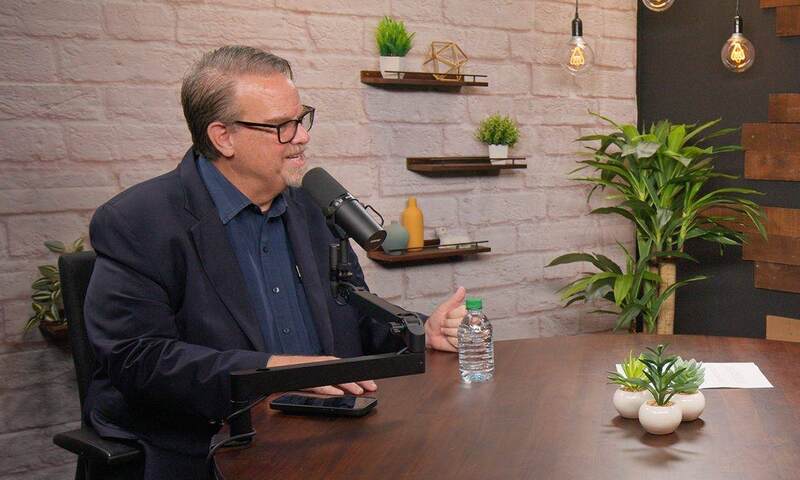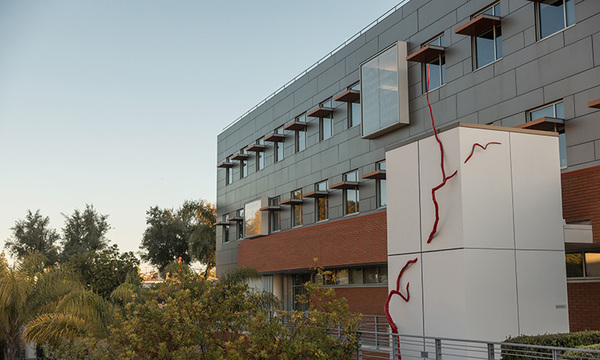For decades, Dr. Ed Stetzer has been a familiar voice to church leaders around the world — widely known for his biblically faithful, culturally engaged insights as a radio host, author, podcaster, Outreach magazine editor, church planter, researcher, higher education leader, and guest contributor to national news outlets.
As of July 2023, he’s become an even more familiar face around the campus of Talbot School of Theology. As Talbot’s visionary new dean, Stetzer is bringing extensive experience and fresh enthusiasm to the academic leadership position — eager to expand the school’s impact and to help equip pastors, ministry leaders, counselors and scholars to be “winsome ambassadors,” as he puts it.
This fall, Talbot Magazine invited Stetzer to sit down with şÚÝ®ĘÓƵ President Barry H. Corey for a wide-ranging conversation about his decision to come to Talbot, his vision for the school’s future, his advice to pastors in a changing world, and more. Below is a partial transcript of their conversation, edited for length and clarity. View the full video of their conversation below.
Dr. Barry H. Corey: Thank you for saying “yes” to come to şÚÝ®ĘÓƵ and Talbot School of Theology, where you are our dean. We are so glad that you accepted our invitation, and God led you and Donna here — where your daughter is also a student at Biola, I might add.
Dr. Ed Stetzer: Super happy on all counts.
Corey: Tell us a little bit about, in your life, on the odyssey that you’ve been on, why Talbot School of Theology at Biola, and why is this such a good fit for you? We know you’re a good fit for us.
Stetzer: I started as a church planter. Donna and I moved to the inner city of Buffalo, New York, to plant a church among the urban poor decades ago, and planted churches there and in Erie, Pennsylvania, and then I just started loving education. We planted our first church when we were too young — didn’t have any seminary training, graduated with just an undergraduate degree with a couple of religion courses and realized I need some training.
So I started doing seminary work, finished a couple of master’s degrees, went down the road, planted those other churches in Erie, did a D.Min., got called to be a professor for a season, and did a Ph.D. while I was there. And so I started getting into research and ended up heading a church planting program at the North American Mission Board and being their director of research. Eventually, I served a decade at Lifeway, where I was the vice president of research, communications, and some other areas. And then it was a twist and a turn. I got this call from Wheaton College to lead the Billy Graham Center and later to be the founding dean of the School of Mission, Ministry and Leadership. I found out I really like higher education and higher education leadership. I love seeing men and women trained in ministry for the good news, the good work of the gospel. So I served there for seven years, launched a school, had a great journey, and then we had a conversation.
I aligned well theologically with the Talbot School of Theology. People aren’t aware: This is the fifth largest multi-denominational seminary in the world. It’s very impactful. And I just felt that I aligned well here. I’m really thankful for your leadership, our provost’s leadership, and I want to put my next 10 to 15 years here at Talbot.
Corey: Well, we’re glad you’re here. I don’t know of many people who are as well connected and aware of what’s happening in not only the national scene for evangelicalism, but globally as well. As you look at the landscape of theological education, what is distinct and unique about Talbot?
Stetzer: First, when you look across the landscape right now, we are really blessed at Talbot to have a provost who is a [former] seminary provost and a president who was engaged in seminary leadership. So, that’s a nice thing to have. But across the theological education landscape, the big story is in decline. What we’re seeing is decline across the board — and we’ve actually experienced some decline at Talbot. Now, let me say clearly that we’re a healthy institution. That’s part of the answer to your question. Why did I come to Talbot? Because it’s got a healthy culture, it’s got healthy theology, it’s got healthy relationships.
I was attracted to the fact that Talbot is rooted in a university — şÚÝ®ĘÓƵ — and is deeply committed to being a part of this university family. I was encouraged because it was clear where it stood theologically. We use the terms “conservative evangelical” to describe and define ourselves, and I think that’s helpful in the world in which we are. It’s not a political statement, but a theological one. And I think that matters really where we are.
I would also say that Talbot is already a world-class theological institution. But it’s not as well-known. When I tell people it’s the fifth largest multi-denominational seminary in the world, they’re surprised. And when I tell them it’s larger than wonderful schools like Trinity Evangelical Divinity School, and I kind of place it where it is in size, people are surprised. All of our alumni would know the Talbot story, and maybe people connected to our alumni would know the Talbot story. But a lot of people don’t know the Talbot story. For good or for ill, I am kind of a loud person. I want to tell the story of the amazing things that Talbot School of Theology is doing. I want to tell a whole lot of people, particularly the globe. We’re on the Pacific Rim and what an opportunity!
Corey: Share some of your hopes and aspirations as we look to the future — because when we selected you and you said “yes” to the invitation, we did so because you are a man of vision and growth and dreams and strength, all within the orthodoxy that is so rooting us here at Talbot.
Stetzer: I think we have to think in terms of maybe two areas of focus. One of them is of course our undergraduate program. Students who come to şÚÝ®ĘÓƵ, they get a Bible minor, they take 30 credits of biblical and theological studies. That’s one of the reasons that as a dad, I was so glad my daughter chose to come to şÚÝ®ĘÓƵ. In a world where many Christian institutions are unsure of how they want to articulate their Christian commitment, it matters that students come from şÚÝ®ĘÓƵ — not just Talbot with a robust engagement in theology and the Bible. In the world in which we live today, confused and compromised, we need the grounding in God’s Word. So that’s a passion to see that continue.
At the graduate level, I’m not coming into Talbot thinking that actually we need some sort of substantive cultural or even academic change. We have a diversity of programs from apologetics programs, to robust spiritual formation programs, Talbot en Español, a Korean program, marriage and family therapy, doctoral programs like the D.Min, Ph.D. and more. I want to tell the story better. I want to engage more students. But I think we have a good solid foundation for where we are. And I think where we go for the future will be determined by how we engage the cultural moment with biblically faithful ministry preparation in an incredibly shifting cultural moment.
And let me also add: Part of my vision is I love that we’re doing this in California. I say that because not everybody is excited about states like California, Illinois or New York. I grew up in New York. I’ve been serving in Illinois. These are not bastions of evangelical faith and practice. But culture tends to come from the coasts inland, and if current trends continue, we’re going to find ourselves in a more secular environment and a more resistant environment. So come to California — and again, you can also study online — but come experience training in a place that knows what it looks like to live with winsome conviction, to have a hard center and soft edges, as you’ve talked about here, and to show and share the love of Jesus in a really broken and divided world.
Corey: In this cultural moment, what are some of the issues that pastors are facing, and what’s some avuncular advice you can give them about what they should be doing or reading or thinking about in this day and age?
Stetzer: I was sitting down in Wheaton with a recent graduate, an evangelical pastoring a wonderful Presbyterian church. And we were talking about ministry today. He said, “I got my M.Div. from one of the well-known Presbyterian Reformed seminaries. I got my Ph.D. at Cambridge. And I’ve got to say most of the things people are asking me about in church right now are not things that I covered in seminary.” Partly because times have shifted so quickly. So I would encourage pastors and church leaders to acknowledge that the acceleration of change coupled with a cultural convulsion, unlike anything we’ve seen since the 60s, has caused cultural issues to accelerate and also to be more divisive.
And so I would say to be engaged and aware of some of what’s going on. The last time I sat in this chair where we’re recording right now was for the [Talbot-produced] Think Biblically podcast. I would encourage people to listen to things like that. We have to think biblically about issues that for most of us — for most of our seminary grads, for most of our alumni — if you went to school 10 years ago, conversations about gender identity were not on the radar. The level of cultural division wasn’t where we are now. But here’s the thing: I’m just convinced that the moment we are in doesn’t pause the mission we are on. The same truths apply in this cultural moment. And, I think missiologically, it’s a wise thing to engage culture in biblically faithful and culturally appropriate ways. We probably need to spend more energy figuring out the cultural moment and then seeking to live out biblical truths in the midst of both an accelerating cultural shift and a remarkable cultural convulsion that we’re walking through.
Corey: There are lots of options for pastors to get training: formal and informal, online, church-based, remote. Many of them are super low-cost and easy to achieve. Among all of the options, what’s the case for Talbot, an embedded seminary at a university with a residential faculty — with lots of online options as well, I might add?
Stetzer: I would start by saying that one of the distinctives about pursuing a prescribed course of study — let’s not talk specifically about Talbot for a moment — is that you’re learning things that Christians have thought through and worked through for 2,000 years. Theological education goes back centuries to say: These are things you should know. [It’s helpful to have] a professor say to you, “We’re going to do a course in theology and you should read these five books, and you’re going to start working through a systematic theology. I need you to know what Christology is when somebody has questions about who Jesus is and what it means to be fully God and fully human.” If you just get trained in a local church, you may never wrestle with that issue. But for 2,000 years, Christians have said there’s some training that’s probably helpful.
Now you can engage that in different ways. Primarily now at Talbot, you can engage that by coming here. There’s something powerful about being in class on a weekly basis in a residential institution. And again, you can do that in California. We’ve got wonderful churches that are partnering and engaging, and wonderful in-residence theological education. I really want to encourage people to do that. People all over the world come here.
And then there is the online option as well. Now, there are all kinds of online programs out there. [People might think] you have some grad student who doesn’t have a degree teaching it, or you’re going to have to do multiple- choice tests, or you’re not going to engage with people. But an online experience at the Talbot School of Theology has our professors, and you engage with them. And there’s community and there’s what we call asynchronous or synchronous. There’s asynchronous experiences that happen on your own, but then there’s synchronous experience as well.
And now increasingly, you’ll hear more and more about us launching modular and hybrid programs — where maybe you are in a city in the Midwest or the East Coast or the Southwest, where we can actually offer a class or two a year there. You do some online. You come to our campus. Everyone loves to walk the Biola campus — particularly in January when they come from Minnesota.
We also have this wonderful Institute of Spiritual Formation. We’re uniquely focused on spiritual formation. In a world where there’s so many pastoral failures, we want you to be rooted in God’s Word and grounded in spiritual formation.
Corey: Let’s end with a zoom-out question. Back to this cultural moment — and with the divisiveness and tribalism and vitriol that is in politics and media, higher education, and even the church — what is your hope for Talbot graduates dispositionally when they leave the seminary and graduate?
Stetzer: We live in a world where far too many Christians have been discipled by their cable news choices and spiritually shaped by their social media. Ultimately, that has produced a people who don’t see through a gospel lens, but see through an ideological lens. I want us to shape the kind of people who engage the world like Jesus.
They don’t see winsome conviction as some sort of strategy that has failed, and that we need a new strategy. No, they see it as the way of Jesus. They’re able to articulate their convictions. And that’s not always easy; the backlash can be difficult. I wrote a story defending one of our sister universities and their view of biblical ethics in USA Today, and I cannot tell you the amount of harassing phone calls and threats that I received in doing so. But I think we need to be able to express those convictions, to disciple God’s people to understand those convictions, and to engage as “winsome ambassadors.” That’s why I called it in my book Christians in the Age of Outrage. I think that’s the call of all Christians. Jesus said, “As the Father has sent me, even so I send you.” So we go with the truth of Jesus, but we also go in the way of Jesus. And going in the way of Jesus doesn’t change because the culture’s changed.
In many ways we’ve lost our home field advantage. You want to see what that looks like? Come to California with us and see what that looks like. We’ve lost our home field advantage. But I’ve read the end of the book. Jesus wins. We’re still called on mission. We still have freedom to proclaim the good news of the gospel. Our graduates are already doing that. We’re looking forward to seeing more. We want to see that transformation, focus on a disciple-making strategy that roots people in God’s Word — not the cultural whims of the day — and then show and share the love of Jesus in a broken and hurting world.
 şÚÝ®ĘÓƵ
şÚÝ®ĘÓƵ

